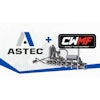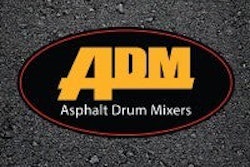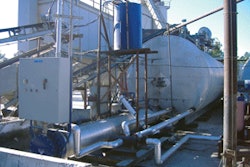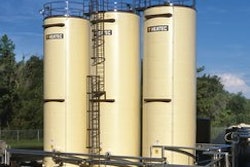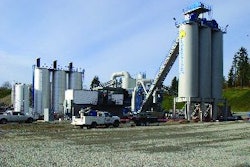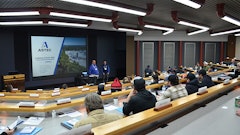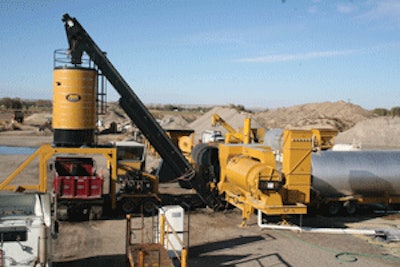
When asked how they first got into the business, most paving professionals will cite a complimentary career path: construction, landclearing, even employment by another paver. Some, however, find their way into their profession via the most unlikely of routes, the strangest of circumstances.
Dave Long falls into that latter category. The Riverton, WY native was well-entrenched in an educational career when his brother moved to Hawaii, setting in motion a chain of events that would lead Long in a direction he had never foreseen.
That was more than two decades ago. Today, he heads up Dave's Asphalt, and, with the recent addition of a Roadbuilder 160 plant from Asphalt Drum Mixers (ADM), he has completed the transition from teaching to securing his place as one of central Wyoming's larger, more successful paving firms.
School's out in Wyoming
The full story of Long's move from academia to the construction world began in 1989 when his brother sold him a parking lot striping business.
"He was leaving the area for Hawaii and felt I needed something to do when school was out - other than play golf," says Long. "I thought it would be a nice way to make a little extra money, so I agreed.
"Soon, in addition to the striping, we were also patching pot holes," he continues. "To do that, we bought mix from different asphalt contractors in the area, often having to haul it quite a distance to the jobs. In the summer of 1990, a local contractor was subbing out projects and asked if we wanted to do some highway approaches for him."
The logistics for the highway jobs were easy, says Long. The contractor was going to supply the mix; all Long had to do was put together a three- or four-person crew and do approximately 60 approaches.
"I felt we could do the work, so I took the job and in six weeks made more money than my annual salary as a teacher. That was a real eye-opener for me - as they say, the rest is history," he states. "We bought a small asphalt plant the next spring, I resigned my teaching job shortly afterwards, and I've been doing this ever since."
All about the plant
The asphalt plant to which Long refers was a 60 ton per hour (tph) ADM 5424 SPL. One of the smaller plants manufactured by ADM, it consisted of a split cold-feed bin, hot oil tank, portable asphalt drum dryer/mixer, oil burner and a 175 kW diesel engine generator.
"It was a 1987 model and even though I was still teaching school at the time, I flew to Paola, KS to look at it. Truth be told, I really didn't even know what I was looking at; I was just wet behind the ears," Long says. "But we bought it and it served us well for almost 20 years. In fact we still have that plant and, even though we've had offers, I'm hanging on to it, thinking we might use it someday as a remote system."
Long's satisfaction with the smaller plant was so complete that, when continued growth and demand for asphalt in the area forced a need to increase production, he contacted Asphalt Drum Mixers.
"One thing we learned over the years was that ADM focuses on simplicity in every aspect of their plant design," he says. "As a result, the new Roadbuilder 160, like the older plant, is extremely easy to run and easy to maintain.
"In addition, most replacement parts are, in every sense of the word, ‘off the shelf,' which is great for us," he continues. "The majority of electrical components and other parts can be found through local stores and shops, so waiting for parts is never an issue. Staying with ADM for the new plant made sense for us on so many levels."
Other features on Long's new plant include a 30-ton self-erecting silo, four cold-feed bins, a 20,000-gallon AC tank, wet scrubber, weigh conveyor, an 8' x 16' control room and the capability to generate various grades of asphalt at a much-needed 165-tph capacity. While RAP does not fit into Long's plans at this time, the system is designed for easy expansion to incorporate it at a later date.
Controlling their destiny
Having a sense of real control - as it has in maintenance issues - is a theme that has been a cornerstone of Long's operations for better than a decade now. For years, like so many paving companies in the area, he had been reliant upon other asphalt producers in the area for his material. And, like so many of his colleagues, he found himself continually frustrated.
"I got tired being at the mercy of a producer; tired of seeing their projects always take priority; tired of being told what hours they will work, when their scales were going to be open, and on and on," Long says. "So when this piece of property came available - 140 acres of land that once housed a little-used quarry operation - we jumped on it."
That was in 1997. Today, Long is at no one's beck and call. His pit provides all the aggregate he needs, both for his own operation and for sale to others in the area.
Energy-driven growth
It might strike some as odd that Long is expanding his operation at a time when most other businesses are struggling just to make ends meet. His answer to that is simple: the Riverton, WY-area economy has been a recipient of a "trickle-down" from the recent boom in energy costs and demands.
"Ask most people which state leads the country in coal production and chances are pretty good they will say West Virginia or Pennsylvania," he says. "The fact is Wyoming mines three times more coal than West Virginia, its closest competitor. That, and an abundance of natural gas and oil, has bolstered the state economy resulting in more funds being available for road repair, new road construction, and other projects."
Long says ensuring his customer base is diverse has also played a big role in his company's success. Though he does relatively little state paving work, almost half his yearly output of 20,000 tons goes toward supplying asphalt to WYDOT for its projects. The rest of his business is a combination of asphalt supply, aggregate supply and private paving projects.
"On the paving side, we handle a broad range of jobs: everything from occasional municipal work, to shopping centers, to a 14-acre paving job for the local casino," he says. "Often, mix specs will differ with regard to types of oil, oil content, different gradations, and so on.
"Making those changes on the fly with the new Roadbuilder 160 is extremely easy," he continues. "All we do is key in our new mix design - a process that takes less than 10 seconds - and we're ready to go; we never have to shut down. That's a nice change for us."
Going mobile is an option
Like its predecessor, the smaller ADM 5424 SPL, Long's new plant is designed to be portable. However, the company has not gone mobile with its asphalt operation in more than five years and has no immediate plans to start doing so.
"We really got used to being home every night and have been fortunate that the local work has always been there, so we haven't pursued much work outside of the Fremont County area," Long says. "But we still like the fact that, should a suitable project arise, we can move this system without much difficulty at all. It's just another feather in our cap as far as I'm concerned."
The future looks very bright for Long and Dave's Asphalt. The company recently moved into a new, larger office/administrative building adjacent to the pit, and orders are steady.
"If we have one nagging problem," he says, "it's getting and keeping quality workers. We are always losing skilled people to the bigger money in the oil fields. But we have an excellent team in place now, a decent outlook for the future, and an asphalt plant that's second to none. I'd say that's a nice position to be in."

